This article was medically reviewed by Erik Kramer, DO, MPH. Dr. Erik Kramer is a Board-Certified Primary Care Physician at the University of Colorado. With over 15 years of experience, his clinical interests include obesity and weight management, diabetes care, and preventive care, as well as embracing a holistic approach to primary care. He received his Doctorate in Osteopathic Medicine (D.O.) from the Touro University Nevada College of Osteopathic Medicine and completed his residency at Central Maine Medical Center. Dr. Kramer is a Diplomate of the American Board of Obesity Medicine.
There are 9 references cited in this article, which can be found at the bottom of the page.
wikiHow marks an article as reader-approved once it receives enough positive feedback. This article received 13 testimonials and 100% of readers who voted found it helpful, earning it our reader-approved status.
This article has been viewed 362,502 times.
Mono, technically mononucleosis, can be caused by the Epstein-Barr virus or cytomegalovirus (CMV)—both strains of the herpes virus. It is spread through direct contact with the saliva of an infected person, which has earned it the nickname "the kissing disease." Symptoms develop about 4-7 weeks after contact and can include a sore throat, severe fatigue, swollen lymph nodes, loss of appetite, and high fever, as well as occasionally soreness and headaches. Symptoms usually last from 2-6 weeks and it is contagious. There is no drug or other easy treatment for mono. The virus usually needs to simply run its course. Here are the best ways to handle mono.[1]
Steps
Diagnosing Mono
-
1Spot the symptoms of mono. Mono is not always easy to diagnose at home. The best way is to look for the following symptoms, especially if they do not go away after a week. Don’t wait too long to see a doctor since symptoms can worsen over time.[2]
- Severe fatigue. You may feel excessively sleepy, or just lethargic and unable to muster any energy. You may find yourself exhausted after the smallest bit of exertion. This can also manifest as a feeling of malaise or general unwellness.
- Sore throat, especially one that doesn't go away after taking antibiotics.
- Fever.
- Swollen lymph nodes, tonsils, or a diagnosis of swollen liver or spleen.
- Headache and body aches.
- Occasionally a skin rash.
- Loss of appetite.
-
2Don't mistake mono for strep throat. Because of a sore throat, it is easy to at first think your mono is actually strep. But unlike strep, which is caused by the Streptococcus bacteria, mono is caused by a virus and cannot be treated with antibiotics. Talk to your doctor if your sore throat doesn't get better after taking antibiotics.[3]Advertisement
-
3See your doctor. If you suspect you have mono, or if you have figured out that you have mono but symptoms continue for more than a week with rest, you should go see your doctor. Your doctor is likely to diagnose you based on your symptoms and feeling your lymph nodes, but they can also perform a blood test to find out more or less for sure.[4]
- Monospot antibody tests check your blood for Epstein-Barr virus antibodies. You will get results within a day, but this test may not be able to detect mono during your first week of symptoms. There is a different version of the antibody test that can detect mono within the first week, but it requires a longer result time.
- Tests looking for elevated white blood cell counts can also sometimes be used to suggest the presence of mono, but won't actually confirm mononucleosis for sure.
Managing Symptoms at Home
-
1Get plenty of rest. Simply sleep and relax as much as possible. Bed rest is the main treatment for mono, and as you will be fatigued it feels like the natural thing to do. Resting is especially important in the first two weeks. [5]
- Due to the fatigue it causes, people with mono should stay home from school and put other regular activities on hold. This doesn't mean you can't be occasionally social, however. Spending time with friends and family can be a good way to keep spirits up during what is otherwise a lousy and frustrating time—just avoid exertion and be prepared to rest when they go home. Avoid physical contact with them, especially any involving saliva, and wash your hands thoroughly.
-
2Drink lots of fluids. Water and fruit juices are best—aim for several 8 glasses of water at the very least per day.
-
3Relieve your sore throat with a salt water gargle. Mix ½ teaspoon (2.5 g) of table salt with 8 fluid ounces (240 ml) of warm water. You can do this several times a day.[6]
-
4Take an over-the-counter pain reliever to reduce throat pain and body aches. If you can take the pain medication with food. Acetaminophen (such as Tylenol), naproxen (Aleve), or ibuprofen (such as Advil or Motrin IB) are all fine.[7]
- Taking aspirin when feverish can put children and teens at risk for Reyes' Syndrome. It is almost nonexistent in adults.[8]
-
5Avoid strenuous activity. Within the first 3 weeks of having mono, your spleen may become enlarged and strenuous exercise, especially heavy lifting or contact sports, puts you at risk of rupturing your spleen. A burst spleen can be extremely dangerous, so go to the hospital immediately if you have mono and experience a sharp, sudden pain in the left side of your upper abdomen or shoulder.[9]
- Abdominal pain can radiate to the shoulder and cause pain even though the spleen is not in that area.
-
6Try not to pass the virus to others. Since symptoms don't manifest until the virus has been in your system for weeks, you may have already infected some people, but do your best to spare your friends and family the misery you are going through. Don't share food, drink, silverware, or cosmetics with anyone. Try not to cough or sneeze on other people. Don't kiss anyone and avoid sexual contact.[10]
Seeking Medical Care
-
1See a doctor if you develop secondary infections. Your body will be weak and more susceptible to invasion from bacteria. Mono sometimes comes with strep or infections of the sinus or tonsils. Watch out for these and go to your doctor for antibiotics if you suspect you are getting a secondary infection.[11]
-
2Seek emergency surgery if your spleen ruptures. If you experience a sharp, sudden pain in your upper abdomen or shoulder, especially during lifting or physical activity, you should get to a hospital immediately or call emergency services.[12]
-
3Realize that antibiotics don’t work for mono. Antibiotics help your body destroy bacterial infections, but mono is caused by a virus. It is also not usually treated with antivirals.[13]
Expert Q&A
-
QuestionWill mono cause stiffness of the neck, back, and legs?
 Marsha Durkin, RNMarsha Durkin is a Registered Nurse and Laboratory Information Specialist for Mercy Hospital and Medical Center in Illinois. She received her Associates Degree in Nursing from Olney Central College in 1987.
Marsha Durkin, RNMarsha Durkin is a Registered Nurse and Laboratory Information Specialist for Mercy Hospital and Medical Center in Illinois. She received her Associates Degree in Nursing from Olney Central College in 1987.
Registered Nurse Mono will cause general body aches, so it could make your neck, back, and legs stiff.
Mono will cause general body aches, so it could make your neck, back, and legs stiff. -
QuestionHow long does it take for mono to go away
 Marsha Durkin, RNMarsha Durkin is a Registered Nurse and Laboratory Information Specialist for Mercy Hospital and Medical Center in Illinois. She received her Associates Degree in Nursing from Olney Central College in 1987.
Marsha Durkin, RNMarsha Durkin is a Registered Nurse and Laboratory Information Specialist for Mercy Hospital and Medical Center in Illinois. She received her Associates Degree in Nursing from Olney Central College in 1987.
Registered Nurse Your symptoms usually subside in 4 weeks however some people can feel ill up to 6 months.
Your symptoms usually subside in 4 weeks however some people can feel ill up to 6 months. -
QuestionDuring mono can you only experience a sore throat?
 Erik Kramer, DO, MPHDr. Erik Kramer is a Board-Certified Primary Care Physician at the University of Colorado. With over 15 years of experience, his clinical interests include obesity and weight management, diabetes care, and preventive care, as well as embracing a holistic approach to primary care. He received his Doctorate in Osteopathic Medicine (D.O.) from the Touro University Nevada College of Osteopathic Medicine and completed his residency at Central Maine Medical Center. Dr. Kramer is a Diplomate of the American Board of Obesity Medicine.
Erik Kramer, DO, MPHDr. Erik Kramer is a Board-Certified Primary Care Physician at the University of Colorado. With over 15 years of experience, his clinical interests include obesity and weight management, diabetes care, and preventive care, as well as embracing a holistic approach to primary care. He received his Doctorate in Osteopathic Medicine (D.O.) from the Touro University Nevada College of Osteopathic Medicine and completed his residency at Central Maine Medical Center. Dr. Kramer is a Diplomate of the American Board of Obesity Medicine.
Doctor of Osteopathic Medicine You'll probably also experience some fatigue and other viral symptoms on top of a sore throat.
You'll probably also experience some fatigue and other viral symptoms on top of a sore throat.
Warnings
- If you still have medication left from another viral infection, do not take it in the hopes that it'll clear up the mono. Antiviral medications react to mononucleosis in roughly 90 percent of patients by causing a rash that doctors can mistake as an allergic reaction.⧼thumbs_response⧽
- Refrain from kissing or sharing a drink or food with anyone while you are recovering from mononucleosis. Likewise, if you are caring for someone with mono, do not take part in any activity that involves the possibility of exchanging saliva.⧼thumbs_response⧽
- Seek immediate medical attention if you develop severe abdominal or shoulder pain. Mono can cause an enlarged spleen, and if it ruptures you should visit the emergency room immediately.⧼thumbs_response⧽
- There is no specific cure for mono. Eating healthy foods, drinking water or juice every day, and getting a lot of rest helps.⧼thumbs_response⧽
- Stay away from infants and people who have weakened immune systems.⧼thumbs_response⧽
References
- ↑ https://www.singlecare.com/conditions/mononucleosis-treatment-and-medications
- ↑ https://www.cdc.gov/epstein-barr/about-mono.html
- ↑ https://www.aafp.org/afp/2004/1001/p1289.html
- ↑ https://my.clevelandclinic.org/health/diseases/13974-mononucleosis
- ↑ https://kidshealth.org/en/teens/mononucleosis.html
- ↑ https://kidshealth.org/en/teens/mononucleosis.html
- ↑ https://health.williams.edu/medical-diagnoses/general-health-concerns/getting-through-mononucleosis/
- ↑ https://www.aafp.org/afp/2009/1215/p1472.html
- ↑ https://www.health.harvard.edu/a_to_z/infectious-mononucleosis-a-to-z
About This Article
To treat a case of mono at home, get plenty of rest for the first 2 weeks and sleep whenever you feel tired or fatigued. When you aren't asleep, make sure you're drinking at least 8 glasses of water every day in addition to other fluids. If you're having throat pain and body aches, take a pain reliever like acetaminophen, naproxen, or ibuprofen along with food. Avoid doing any high-impact activities, and remember to wash your hands and cover your mouth to prevent the spread of germs. For tips on diagnosing mono symptoms and seeking medical care when needed, read on!
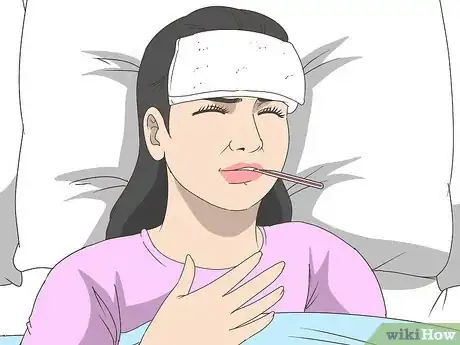

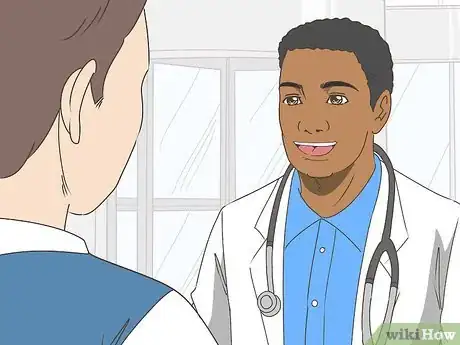



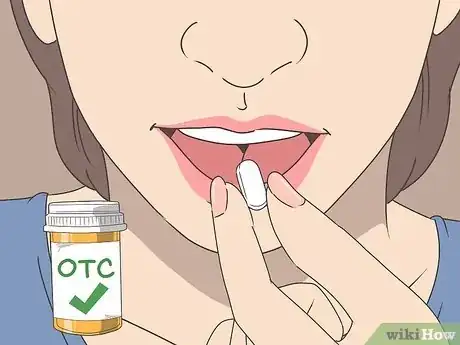





-Step-11-Version-2.webp)
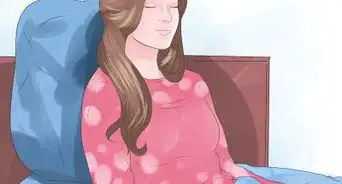
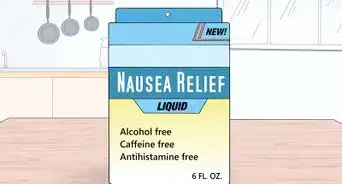

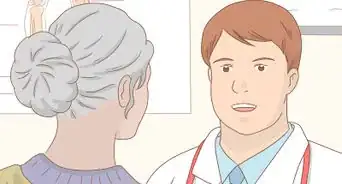


-Step-13.webp)


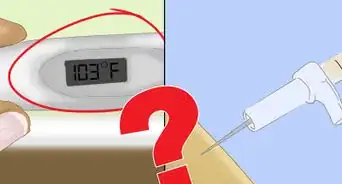











-Step-11-Version-2.webp)






































Medical Disclaimer
The content of this article is not intended to be a substitute for professional medical advice, examination, diagnosis, or treatment. You should always contact your doctor or other qualified healthcare professional before starting, changing, or stopping any kind of health treatment.
Read More...